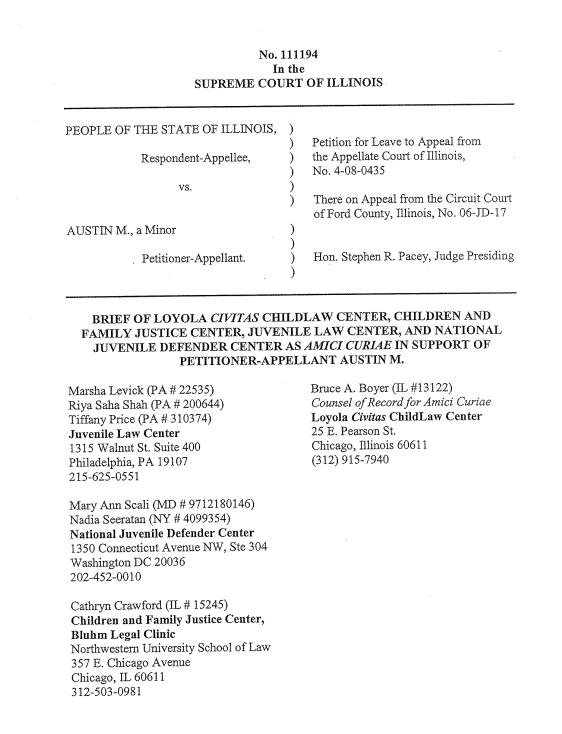
Summary of Argument
The question before this Court is whether Austin M's constitutional right to counsel in a delinquency proceeding has been breached where his lawyer served as both counsel and Guardian ad Litem (GAL). In this dual role, the lawyer was tasked with defending Austin M. against allegations of delinquency, while simultaneously tasked with advising the court as to Austin’s best interests and how they bore on the outcome of the delinquency proceeding. Amici submit that these two assigned roles are incompatible, creating a conflict of interest per se which requires reversal of the adjudication below.
Austin M's right to counsel is not at issue. Nearly 45 years ago, the United States Supreme Court held that children charged with delinquency have a fundamental constitutional right to counsel under the Due Process clause of the Fourteenth Amendment. In re Gault, 387 US 1 (1967). Gault followed on the heels of the Supreme Court's decision four years earlier in Gideon v. Wainwright, where the Court held that criminal defendants have a constitutional right to counsel under the Sixth and Fourteenth amendments. Gideon v. Wainright, 372 U.S. 335 (1963). In Gideon, the Court wrote:
The right of one charged with crime to counsel may not be deemed fundamental and essential to fair trials in some countries, but it is in ours... "The right to be heard would be, in many cases, of little avail if it did not comprehend the right to be heard by counsel. Even the intelligent and educated layman has small and sometimes no skill in the science of law. If charged with crime, he is incapable, generally, of determining for himself whether the indictment is good or bad. He is unfamiliar with the rules of evidence. Left without the aid of counsel, he may be put on trial without a proper charge, and convicted upon incompetent evidence, or evidence irrelevant to the issue or otherwise inadmissible. He requires the guiding hand of counsel at every step in the proceedings against him. Without it, though he be not guilty, he faces the danger of conviction because he does not know how to establish his innocence."
Gideon, 372 U.S. at 344-45 (quoting Powell v. Alabama, 287 U.S. 45, 68-69 (1932)). The prominence of counsel in our hierarchy of due process was underscored in Gault, where the Court extended the right to counsel to children charged with delinquency in juvenile court:
Under our Constitution, the condition of being a boy does not justify a kangaroo court.... There is no material difference in this respect between adult and juvenile proceedings of the sort here involved... The juvenile needs the assistance of counsel to cope with problems of law, to make skilled inquiry into the facts, to insist upon regularity of the proceedings, and to ascertain whether he has a defense and to prepare and submit it. The child "requires the guiding hand of counsel at every step in the proceedings against him.
387 U.S at 28-29 (footnotes omitted).
The precise question before this Court is what this settled right to counsel in juvenile court means: Do children have the same right to a zealous, conflict-free advocate as an adult, with a singular duty to defend them against the state and to hold the state to its heavy burden under our constitutional framework? Does Austin M. have the right not only to the guiding of hand of counsel to help him navigate the complex proceedings and adverse consequences at issue in juvenile court, but a right to counsel who will give voice to his own expressed interests and desires without regard to the views of the state, the judge, other stakeholders or even his own lawyer as to what is 'best' for him?
In 1963, Attorney Abe Fortas - who four years later would author the Supreme Court's Gault decision after his appointment to the United States Supreme Court -- asked the Court a simple question on behalf of his client, Clarence Earl Gideon:
"I believe this case dramatically illustrates that you cannot have a fair trial without counsel. Under our adversary system of justice, how can our civilized nation pretend that there is a fair trial without the counsel for the prosecution doing all he can within the limits of decency, and the counsel for the defense doing his best within the same limits, and from that clash will emerge the truth?"
Anthony Lewis, Gideon's Trumpet 171 (1964).
The clash of adversaries remains the tested method for arriving at the truth under the dictates of our Constitution. Austin M. has the right to a lawyer who will do "all he can within the limits of decency" to ensure his own voice is heard amid that clash.